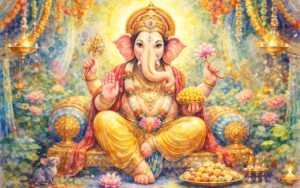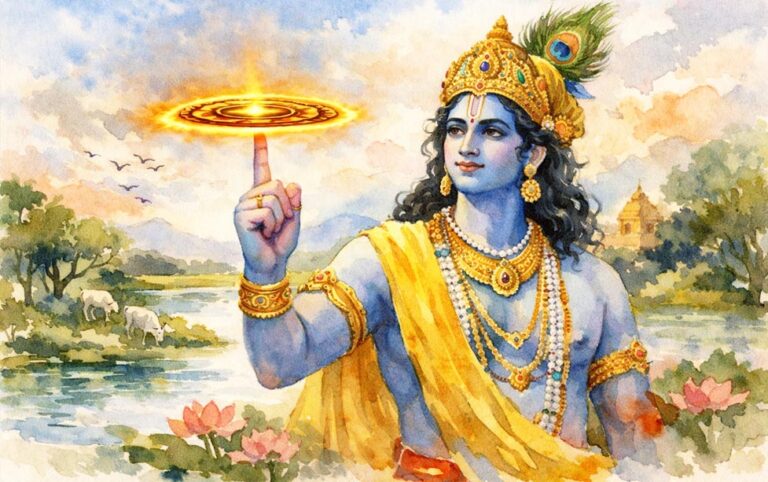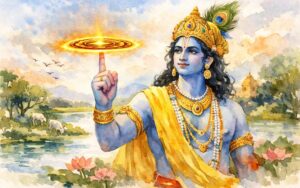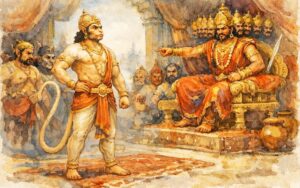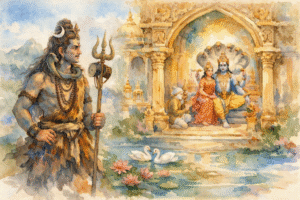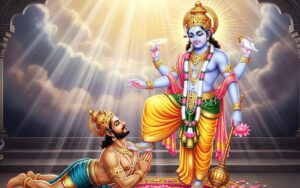
No time for reading the blog? Give it a listen on Spotify.

The Puranas reveal karma as the universe’s most impartial law, silently shaping our lives across lifetimes in the pursuit of balance and liberation.
Human justice systems rely on courts, evidence, and judges. They are imperfect, subject to bias, delay, and even corruption. The Puranas, however, remind us of a subtler and far more infallible law: karma, the principle that every thought, word, and action leaves an imprint on the soul and inevitably returns to the doer.
Unlike human law, karma does not need witnesses. It does not depend on power, wealth, or status. It works silently, across lifetimes, balancing accounts in ways often invisible to us.
The Garuda Purana says: “As the calf finds its mother among a thousand cows, so do one’s deeds return to the doer.” This idea — that nothing is ever lost — is the cornerstone of cosmic justice.
Karma Through the Puranic Lens
The Puranas do not describe karma as a punishment system meted out by an external God. Instead, karma is portrayed as the natural law of cause and effect. Dharma (right action) creates harmony, while adharma (wrong action) creates imbalance. That imbalance must eventually be corrected — not as vengeance, but as restoration.
The Garuda Purana goes further, offering vivid accounts of the soul’s journey after death, where it faces the results of its deeds. The experiences of heaven (svarga) or hell (naraka) are not permanent abodes but temporary states, reflections of one’s karmic account. Just as a seed inevitably sprouts, so too do our actions bear fruit.
Stories as Mirrors of Justice
The Puranas convey these truths through powerful narratives:
King Harishchandra
Harishchandra’s story in the Markandeya Purana illustrates how unshakeable truthfulness, even amid suffering, aligns one with cosmic order. Though he lost his kingdom, family, and peace, his adherence to truth eventually restored balance and earned divine grace. Karma here is shown not as immediate comfort, but as the assurance that integrity never perishes.
Ajamil in the Bhagavata Purana
Ajamil lived a life of sin, but at the moment of death he called out to his son named “Narayana.” This act invoked the divine name and transformed his karmic trajectory. His story shows that karma is not a fixed ledger; it is fluid, and sincere repentance, awareness, and devotion can rewrite its course.
Markandeya
Destined to die at sixteen, Markandeya worshipped Shiva with full devotion. When Yama, the god of death, came to claim him, Shiva himself intervened, granting him immortality. Markandeya’s story highlights that accumulated merit (punya) can even alter destiny, protecting the soul from untimely harm.
Each of these stories demonstrates that karma is impartial but not rigid. It bends for devotion, truth, and sincere transformation.
Beyond Retribution: Transformative Karma
One of the most profound philosophical insights from the Puranas is that karma is not about reward and punishment. Instead, it is about education and evolution. Every joy and every hardship is a lesson, gently (or sometimes forcefully) nudging the soul toward higher awareness.
Western thought often frames justice in binary terms — guilty or innocent, punished or acquitted. The Puranas invite us to see beyond this.
A painful experience is not “punishment” but an opportunity to outgrow ignorance, ego, and selfishness. A fortunate experience is not “reward” but a reminder of dharma well lived. Karma teaches — always.
Relevance in Modern Life
In today’s world, we are frequently disturbed by what appears to be injustice:
The corrupt seem to thrive.
The innocent suffer.
Effort does not always yield success.
From a Puranic perspective, this is not injustice, but unfinished karma. We witness only fragments of a vast continuum that stretches across lifetimes. Just as one cannot judge a book by a single chapter, we cannot judge justice by a single lifetime.
This perspective offers both comfort and challenge. Comfort, because it assures us that no action goes unnoticed; challenge, because it places responsibility squarely on us. We cannot blame fate, chance, or divine whim. We are co-creators of our destiny.
Living With Karma-Consciousness
The Puranas, while lofty in their cosmic scales, bring us back to simple daily living:
Act with Awareness: Every choice, however small, has ripples. Words spoken in anger, acts of kindness, or even thoughts — all create seeds of karma.
Balance Dharma and Desire: The texts never demand renunciation of life but ask us to align desires with dharma, so that pleasure does not turn into bondage.
Transform Through Bhakti: Devotion to the divine, whether through mantra, meditation, or service, refines karmic patterns and softens their weight.
Patience and Trust: Justice may not appear instantly, but the Puranic worldview assures that it never fails.
The Puranas remind us that karma is the ultimate judge, binding kings and beggars, devas and asuras alike. Life, then, is not random but a classroom where every joy and sorrow carries meaning. Karma is less an accountant of deeds and more a teacher guiding us toward liberation.
The cosmic ledger is flawless — the real question is: what seeds are we planting today?




